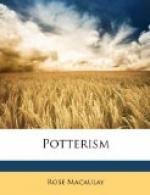She had fallen back with closed eyes.
A little later, when she had revived, we had had tea together, and I had put a few questions to her. She had told me little more than what she had revealed as she gazed into the crystal. But it was enough. She knew the fair man for Oliver, for she had seen him at the wedding. She had not seen the dark man’s face, nor had she ever met Arthur Gideon, but her description of him was enough for me.
I had left the house morally certain that Arthur Gideon had murdered (or anyhow manslaughtered) Oliver Hobart.
7
I told Percy that evening, after Clare had gone to bed. I had confidence in Percy: he would believe me. His journalistic instinct for the truth could be counted on. He never waived things aside as improbable, for he knew, as I knew, how much stranger truth may be than fiction. He heard me out, nodding his head sharply from time to time to show that he followed me.
When I had done, he said, ’You were right to tell me. We must look into it. It will, if proved true, make a most remarkable story. Most sensational and remarkable.’ He turned it over in that acute, quick brain of his.
‘We must go carefully,’ he said. ‘Remember we haven’t much to go on yet.’
He didn’t believe in the crystal-gazing, of course, so had less to go on than I had. All he saw was the inherent possibility of the story (knowing, as he did, the hatred that had existed between the two men) and the damning fact of Gideon’s presence at the house that evening.
‘We must be careful,’ he repeated. ’Careful, for one thing, not to start talk about the fellow’s friendship with Jane. We must keep Jane out of it all.’
On that we were agreed.
‘I think we must ask Clare a few questions,’ said Percy.
He did so next day, without mentioning our suspicion. But Clare could still scarcely bear to speak of that terrible evening, poor child, and returned incoherent answers. She knew Mr. Gideon had been in the house, but didn’t know what time he had gone, nor the exact time of the accident.
I resolved to question Emily, Jane’s little maid, more closely, and did so when I went there that afternoon. She was certainly more circumstantial than she had been when she had told me the story before, in the first shock and confusion of the disaster. I gathered from her that she had heard her master and Mr. Gideon talking immediately before the fall; she had been surprised when her mistress had said that Mr. Gideon had left the house before the fall. She thought, from the sounds, that he must have left the house immediately afterwards.
‘It is possible,’ I said, ’that Mrs. Hobart did not know precisely when Mr. Gideon left the house. It was all very confusing.’
‘Oh, my lady, indeed it was,’ Emily agreed. ’I’m sure I hope I shall never have such a night again.’
I said nothing to Jane of my suspicion. If I was right in thinking that the poor misguided child was shielding her husband’s murderer, from whatever motives of pity or friendship, the less said to disturb her the better, till we were sure of our ground.




